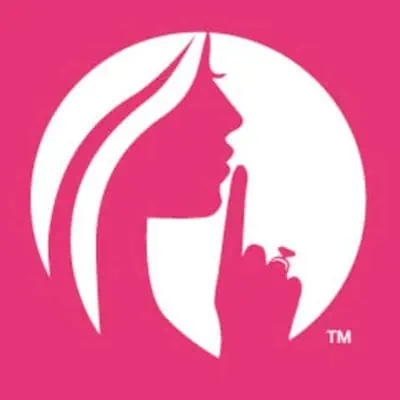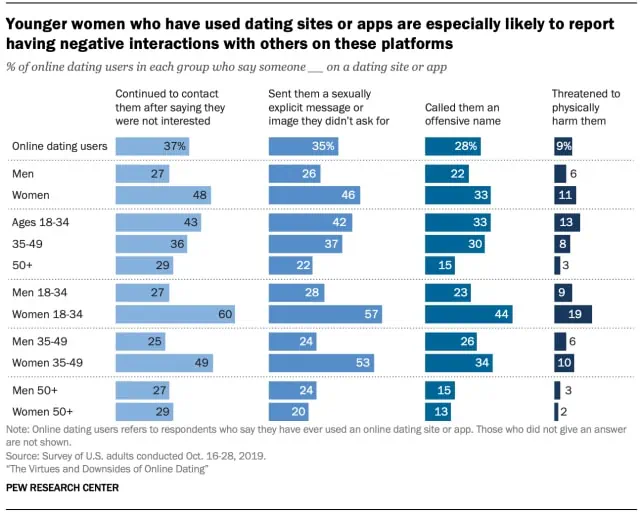Venturing into the world of online dating can feel like hitting the jackpot with so many dating app choices—it’s like three gold bars or lemons or whatever gets the slot machine to make a siren noise and coins pour out. But here’s the truth: Not all of them are above board. In fact, some are shady as heck and find themselves on a dating app blacklist.
It may appear as though you’re signing up for a decent chance at finding love, but some of these dating apps will swipe your personal info and data the second you hit that “upgrade” button and enter your credit card number, expiration date, and three-digit security code. It’s like thinking you’ve picked a chocolate with caramel, but when you bite into it, it’s filled with that weird cherry syrup—or worse, coconut.
All metaphors aside, it’s tricky out there—you’ve got to be super cautious to dodge the duds to find a good platform.
Some dating apps promise you the sun and the moon, but in the end, all they deliver is a womp womp noise, and that’s the best-case scenario. The worst case scenario is you get your pocket picked by a shady platform, or you get your heart broken by someone who’s not who they claim to be.
So, we are putting together a blacklist of dating apps for anyone who’s tired of subpar or downright shady platforms and wants the real story on which apps are guilty of what so you’ll know right off the bat which ones to avoid. Stick with us, and we’ll clue you in on the money pits, ones with safety and security issues, and unethical practices so you can save your time, money, and maybe even heartache.
Updated Directory of Blacklisted Dating Apps
Without further fanfare, here is a list of blacklisted dating apps for your perusal—keep in mind that just because they are listed, we aren’t telling you not to use them, but you should proceed with extreme caution.

Ashley Madison
We don’t need to tell you about the Ashley Madison data breach—you already know about it even if you didn’t read about it here. While the people on that platform were there to be duplicitous to their spouses, no one deserves to have their private info on display to criminals. The breach ruined lives, and even if the platform shored up its security to be impenetrable, we don’t care.
Fool us once; shame on you. Twice? You know how the saying goes. So we feel that the Ashley Madison dating app is persona non grata when it comes to dating—and if you want to cheat on your spouse, maybe stop being married? Just sayin’.

Cougar Life
Your turn on the chopping block, Cougar Life!! Member feedback shows tons of issues with customer support, with unreasonably long wait times and unresolved complaints being a big concern.
- Fraudulent Charges: One specific complaint involved an unauthorized charge on a user’s credit card associated with Cougar Life, raising concerns about potential financial risks.
- Unethical Paid Subscription Concerns: Other complaints against Cougar Life say that users have experienced unethical subscription practices. Users reported receiving messages as free members, which prompted them to subscribe to a premium membership. However, after subscribing, they found that their access was suspended with no explanation, and customer support did not respond to inquiries, leading to accusations that the app was a scam.
- Deceptive Practices and Profiles: Other users said that after paying for a subscription, the engagement they had as free members, like flirts and messages, suddenly stopped, fueling further suspicions of deceptive practices. Additionally, there are reports that users received messages from what appeared to be fake profiles as an enticement to pay for an upgrade, only to find out there was no real person behind the dating profile. Super shady!

Grindr
Welp, the Grindr dating app has A LOT of issues, meaning you should steer clear of this platform. They include:
- National Security Concerns: In 2018, Grindr was sold to Beijing Kunlun, a Chinese gaming company, which raised concerns among users and lawmakers about national security risks, particularly related to the app’s use near U.S. military bases. The U.S. government body CFIUS later determined the ownership posed a national security risk! Yikes.
- Privacy Issues: Grindr has been criticized for its weak privacy protections. In 2020, the company was fined for sharing private user data with advertisers, and an investigation showed that Grindr tracked and sold individual users’ location data from at least 2017 to 2020. Additionally, concerns have been raised about the app’s operation in countries where being gay is illegal, potentially putting users in harm’s way.
- Content Moderation and Harassment: Users have reported harassment and identity-based threats from others on the app, and Grindr’s policy of deleting data makes it difficult to track and ban offending accounts, which certainly doesn’t help. With only 75 moderators for 11 million monthly active users, experts have called the resources for moderating content insufficient, although Grindr has partnered with an AI company in an effort to help scale its moderation efforts. In our opinion, it’s too little, too late.

OkCupid
Okay, OkCupid—we see you’ve been a naughty little cherub, according to user feedback! Here’s what we found and why this dating app is blacklisted.
- Fraud Concerns: Users have reported fraudulent activity, such as unauthorized use of their profiles and phone numbers. Complaints about the company’s response to these issues show a lack of support for the victims of the fraud at hand.
- Algorithm and Match Issues: Some users have criticized the app’s matching algorithms and filtering options, expressing frustration over the lack of responses to their help requests and the relevance of the matches recommended by the app.
- Fake Profiles and Subscription Model: A fair number of users who paid for a premium membership in order to access who “liked” their profiles found that most came from probable fake profiles located far away, which demonstrates a pattern of misleading members to encourage paid subscriptions.
The Importance of Safe Online Dating
App developers have a huge responsibility to their users to ensure their safety and security when it comes to online dating—it is critical that they put guardrails in place to protect their members.
Developers have to create a safe digital space by using features like photo verification, reporting mechanisms, and, most importantly, encrypted technology to stop any fraudulent activity, harassment, or data breaches. Users hand over a lot of sensitive data—personal info and financial details, so when a hack happens, members are vulnerable to identity theft or credit card fraud. Moreover, incorporating educational resources within dating apps can empower users to date safely in the real world.
The Stats
Negative experiences on dating apps are a significant concern—according to a Pew Research Center study, about four in 10 online daters (42%) describe their personal experience with dating apps as at least somewhat negative.
Lots of users believe dishonesty is a common issue, with 71% saying it’s super common for people on these platforms to lie to appear more desirable. Another 50% of users think that fake accounts used to scam others are widespread, and 48% have received sexually explicit messages or images they did not ask for.
The open nature of online dating, like most social platforms, can lead to uncivil or downright cruel behavior, with a notable number of users experiencing harassment—37% of users report being contacted persistently after expressing disinterest, 35% received unsolicited sexually explicit messages or images, and 28% were called offensive names.

As for data breaches, the Ashley Madison hack in 2015 was one of the most infamous dating app security breaches, exposing the personal data of over 30 million users, including names, addresses, credit card info, and, um, more private preferences about their “wants” when it came to dating. This hack was not only a violation of privacy but also resulted in extortion attempts, as hackers threatened to release users’ information unless a ransom was paid. The collateral damage was immense, leading to public shaming and even reports of suicides linked to the leak.
After the breach, users reported receiving blackmail threats—it had a profound impact on both personal relationships and professional reputations, as the dating app was targeted at those seeking extramarital relationships.
While specific personal stories from this breach are not detailed here due to the sensitive nature of the info, the breach serves as a real-life example of the dangerous consequences that can come from a lack of security in digital spaces, particularly in the context of online dating. It underscores the need for strong cybersecurity measures to protect user data and any potential harm that can come from the misuse of personal info.
How We Evaluate Dating Apps
How do we decide which dating apps qualify for our blacklist? We don’t—we aren’t just picking random platforms because it’s a personal thing! Our criteria for landing a spot on the blacklist is pulled from public information, such as news stories about data breaches, real user complaints and stories, and whistleblower reports.
Detailed Criteria for App Evaluation
What are our requirements or red flags that get dating apps a featured spot on our blacklist? Look below to see the criteria!
- Lack of User Privacy Protection: The app fails to safeguard personal information and allows unauthorized access to user data.
- Inadequate Age Verification Systems: The app does not have robust age verification processes, allowing underage users to access it.
- Promotion of Illegal Activities: The app promotes or is complicit in illegal activities like human trafficking or the sale of illegal substances.
- Absence of Anti-Harassment Features: The app lacks the necessary features to report harassment or does not take action on reported incidents.
- Poor Security Measures: The app has poor security infrastructure, leading to data breaches and exposure of sensitive user information.
- False Advertising: The app engages in deceptive practices, such as fake profiles or bots, to simulate user activity.
- Lack of Content Moderation: The app does not moderate content effectively, leading to the proliferation of hate speech, violence, or pornography.
- Non-compliance with Regulations: The app does not comply with legal regulations, such as GDPR, CCPA, or other data protection laws.
- Unethical Subscription Practices: The app uses deceptive billing practices, such as hidden fees or difficulty canceling subscriptions.
- Poor User Experience: The app has an excessive number of ads, glitches, or spam, leading to a negative user experience.
- Discrimination: The app allows or encourages discrimination based on race, gender, sexuality, religion, or other protected characteristics.
- Encouragement of Dangerous Behaviors: The app encourages or does not take measures to prevent dangerous behaviors, such as unprotected sex or drug use.
- Lack of Support for User Concerns: The app does not provide adequate customer support for user complaints and issues.
- Manipulative Algorithms: The app uses algorithms that manipulate user choices or promote addictive behavior.
- Infringement of Intellectual Property: The app violates intellectual property rights, such as using images or trademarks without permission.
Our Process for Regularly Updating the Blacklist
We are constantly updating every single dating app we have previously reviewed to report any changes in ownership, prices, or new features—basically anything that affects our readers and those who use dating platforms. And if we spot any shady dealings or potential red flags, we add them to our evaluations on our main reviews page!
Tips for Recognizing Untrustworthy Apps
Recognizing untrustworthy apps, especially in the context of online dating, is crucial for digital safety. Here are some easy and practical guidelines to help spot potentially harmful dating apps!
- Check Reviews and Ratings: Look for a big number of reviews and ratings in the App Store or online on sites like TrustPilot, Consumer Affairs, or SiteJabber. A low number of reviews or overwhelmingly negative feedback can be a red flag.
- Research the Developer: Look into the app developer’s reputation. A lack of transparency, such as missing or vague info about said developer, can mean potential risks.
- Read the Privacy Policies: Read the privacy policy carefully—any dating app that takes privacy seriously should clearly explain how your data is used and protected.
- Beware of Over-Promising: Be super cautious of apps that promise too much, such as guaranteed matches or quick results in finding your perfect romantic partner. These could be tactics to get users to pay for an upgrade—and no app can promise to find your soulmate, no matter how excellent its reputation or how safe and secure it is.
- Watch Out for Unusual Permissions: If an app requests permissions that are not relevant to its functionality, like accessing your contacts or location when there is absolutely no need, this is a bright red flag.
- Look for Secure Payments: Make sure that any in-app purchases or subscriptions are processed securely and that there is transparency about the terms of the transaction.
- User Interaction: Be on alert if you get a lot of messages or matches before you’ve even completed your dating profile! This is a well-known tactic to lure you into paying for a premium membership and screams “fake profiles ahead.”
- Beware of Catfishing Scams: If users on the app seem overly eager to move the conversation to other platforms or ask for money, they are probably not for real.
- Human Trafficking Concerns: Some platforms may be used by human traffickers to exploit victims—warning signs include profiles pushing users to move quickly in relationships, vague personal details, and inconsistent stories. Always, always report suspicious profiles and interactions to the app and local authorities.
By staying vigilant and following these guidelines, you can better protect yourself from potentially harmful dating apps that could jeopardize your privacy, finances, or safety.
Safe Alternatives to Blacklisted Apps
For the most part, dating apps are safe to use—we wouldn’t do what we do if they weren’t!! The platforms on our blacklist are the exceptions, not the rule.
If you are interested in signing up for online dating, there are plenty of platforms that more than meet safety and security standards. Some even go above and beyond, and these apps are listed below!
What Makes a Safe Dating App?
What constitutes a trustworthy or reliable dating app? Well, for one thing, robust safety and security measures when it comes to the platform. Additional factors include email, mobile phone, and photo verification features, a strong moderation team, good responsiveness, customer support, and the ability to block or report other accounts easily.
You can check out our vetted list on our Safe Dating Apps Page for more info on how and why these platforms make the cut when it comes to user safety!
Frequently Asked Questions
In our FAQ section, we want to cover the most important questions and concerns when it comes to shady dating apps and how we come to our conclusions. We’ve curated a list of the most frequently asked questions to give you quick and helpful answers.
What Is a Dating App Blacklist?
A dating app blacklist is our list of platforms that we have flagged for engaging in practices that put users at risk, such as scams, privacy breaches, or a lack of security measures.
How Do I Check if a Dating App Is Blacklisted?
That’s where we come in! There aren’t too many places that will straight up tell you if a platform is unsafe or shady, which is why we decided to make a blacklist. In addition to checking here, you can search for reviews online, visit forums, or check with online review websites to see what real users have to say about their experience on a dating app.
What Safety Measures Should I Take When Using Dating Apps?
Always keep your personal info private, use strong passwords, enable two-factor authentication, and meet in public places for first dates.
How Do I Report a Suspicious Profile or Behavior?
Use the report feature within the app, giving as much detail as possible. Also, consider reporting to your local authorities if you feel there is a threat to your or others’ safety.
What Can I Do if I’ve Had a Bad Experience on a Dating App?
Report the incident to the app administrators, consider posting a review to inform others about it, and contact the authorities if necessary.
Are There Safe Dating Apps?
Of course, there are! Most prioritize user safety with features like photo verification, secure messaging, and strict privacy policies. Research and choose the ones with a solid reputation for safety.
How Can I Avoid Scams on Dating Apps?
Never send money or personal info to someone you’ve met on a dating app, and be wary of dating profiles that seem too good to be true—9 times out of 10, they usually are.
Do Human Traffickers Really Use Dating Apps?
Unfortunately, yes. Traffickers use dating apps to target vulnerable individuals by creating fake profiles—they build trust through romantic or persuasive tactics before coercing individuals into trafficking situations. It’s crucial to remain cautious, never share personal info or details too quickly, and report any suspicious activity to the app in question and to local authorities—yes, the police. Don’t be afraid you’re overreacting, and trust your gut.
Contact Us for Help
If you need help or have any concerns about sussing out shady apps, we’re here to help, so please don’t hesitate to visit our contact page to reach out to us! Our team of experts is committed to giving you the resources and info you need to be safe when looking for love and connections on dating apps.